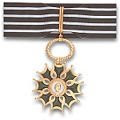
Since six of my readers tell me they don't care for vanilla in perfume, I thought I'd explain why vanilla is in most perfumes.
The vanilla note is a must for all love potions, as it's long been considered an aphrodiasiac scent molecule. Not only does it smell good on its own, but it enhances the fragrance of other notes, especially woods, spices, peppery notes and florals. If you want your sandalwood to smell stronger or richer, paring it with vanilla can do the trick. A rose is rosier when the right amount of vanilla is added. Vanilla can take the sharp edge off peppery or ginger notes while keeping them true.
Vanilla is also a natural fixative for perfumes. (Not all natural fixatives are safe to use, so vanilla is a good choice.)
I love the way Guerlain and Goutal use vanilla in their fragrance bases. It's always there, but so well done, so well blended, that it doesn't stand out, except in the creations they want it to stand out in (for Annick Goutal that would be the almondy soft Vanilla Exquise and for Guerlain the delicious smoky Spiritueuse Double Vanille.)
Vanilla planifolia is just like every other note in perfumery, you'll love the way it's handled in one scent, and dislike it in another. ( I used to say I couldn't wear any perfumes with a cinnamon note in them--until I found I'd been happily wearing a few for several years.) It's impossible for me to list every single note when describing a perfume, so mostly I list a small percentage, to give a general idea of what the perfume might be like. However, the only way to tell is to smell.
Chances are though, if you don't like pure vanilla when baking or eating desserts, you're not going to enjoy a gourmand perfume like Hanae Mori's Butterfly or other perfumes that may use a larger amount of vanilla. Each perfumer or fragrance company has their own way of blending vanilla, and the quality varies.
Visual: Vintage perfume poster / Asia.


